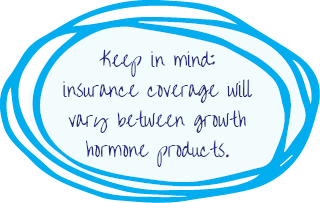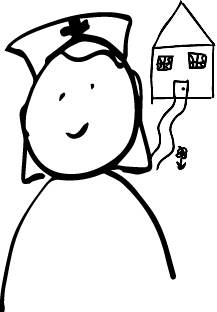Treating a GHD or growth disorder
Your pediatric endocrinologist may discuss the possibility of treating your child’s GHD or growth disorder with hormone therapy – a decision that will be up to you, as parent and/or caregiver.
Treatment typically involves replacing the missing growth hormone through daily injections, given in the arms, legs, abdomen or buttocks. This is called growth hormone replacement and can last for several years.
Be aware: there is a limited window of opportunity to boost your child’s growth through treatment. The earlier GHD is identified and treated, the more time your child will have to grow before their bones reach maturity and growth slows naturally.
When it comes to other growth disorders, treatment may be tailored to the specific condition and person being treated.
PLEASE NOTE: Treatment options listed below may not be available for all growth disorders. It is important to consult your child’s healthcare team before making any treatment-related plans.
Each product requires a different level of preparation and/or administration – you can ask your pediatric endocrinology team for a live demonstration.
Keep in mind: insurance coverage will vary between growth hormone products. Consult your child’s pediatric endocrinology team to discuss payment options before selecting a treatment option.

Setting expectations

Patient Support Program
Your Patient Support Program may be designed to help you access and coordinate coverage for your child’s growth hormone treatment. Once treatment is secured, the Program will generally provide you with device training and ongoing support for the duration of your child’s treatment.
Here are some services to look for:
- Financial assistance (and/or insurance coordination)
- In-home device training by Registered Nurses
- Dedicated nursing visits, in the comfort of home
- 24/7 phone support from Registered Nurses
- Access to free supplies
If you are interested in learning more about a certain Patient Support Program’s benefits and offerings, you can reach out to them directly.
What to expect from the first year of treatment
It is important to be patient; you will not see an increase in your child’s height overnight. Once treatment is started, it may take months to notice growth – provided injections are carried out consistently, as prescribed.
Your child will see the pediatric endocrinology team regularly throughout the duration of treatment, and your Patient Support Program will be a major source of support as well – providing nurse check-ins, device and training updates and ongoing care.
Depending on your child’s specific growth condition, it is likely they will remain on treatment for several years – until adult height is achieved, growth has slowed and/or bones have matured. And in some cases, growth hormone is continued throughout adulthood.
Routine injections play a critical role in managing a GHD or growth disorder, along with proper diet, steady sleep and regular exercise.
Help your child adopt healthy habits early on!

Living with a GHD or growth disorder

As parents and caregivers, we all have hopes and dreams for our children – we want them to achieve goals, discover passions and ultimately, find happiness.
Even though physical growth has little to do with a child’s potential, a GHD or growth disorder can feel like a barrier to success.
It is incredibly important for you – as a parent and caregiver – to ensure your child’s short stature does not make him or her feel inadequate or incapable.
You can help build your child’s self-esteem by:
- Praising and encouraging as much as possible, while avoiding sarcasm and negativity
- Determining your child’s strengths and working to build on them
- Get your child involved in sports and physical activities in which being tall has no advantage
- Encourage your child’s creativity through the arts, including writing, poetry and music
REMEMBER: Developing a positive self-image is just as important as building a taller stature
Check out some helpful resources.


Print Discussion Guide now, save it as a PDF or email it.
Saizen and Easypod are registered trademarks of Merck KGaA, Darmstadt Germany. Norditropin is a registered trademark of Novo-Nordisk A/S. Norditropin, NordiFlex and NordiCare are registered trademarks of Novo Nordisk Health Care AG. Genotropin, MiniQuick, and GoQuick are registered trademarks of Pfizer Health AB. Nutropin AQ and NuSpin are registered trademarks of Genentech, Inc. Omnitrope and Surepal are registered trademarks of Novartis AG. Humatrope and HumatroPen are registered trademarks of Eli Lilly and Company.








